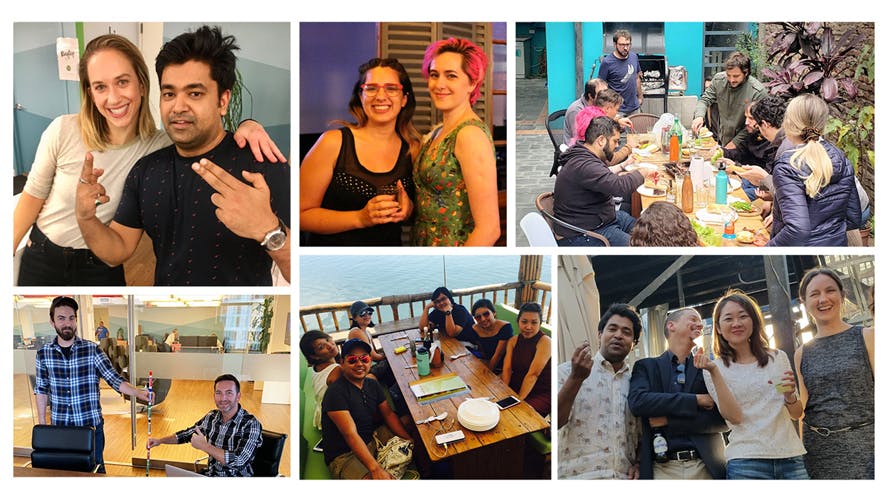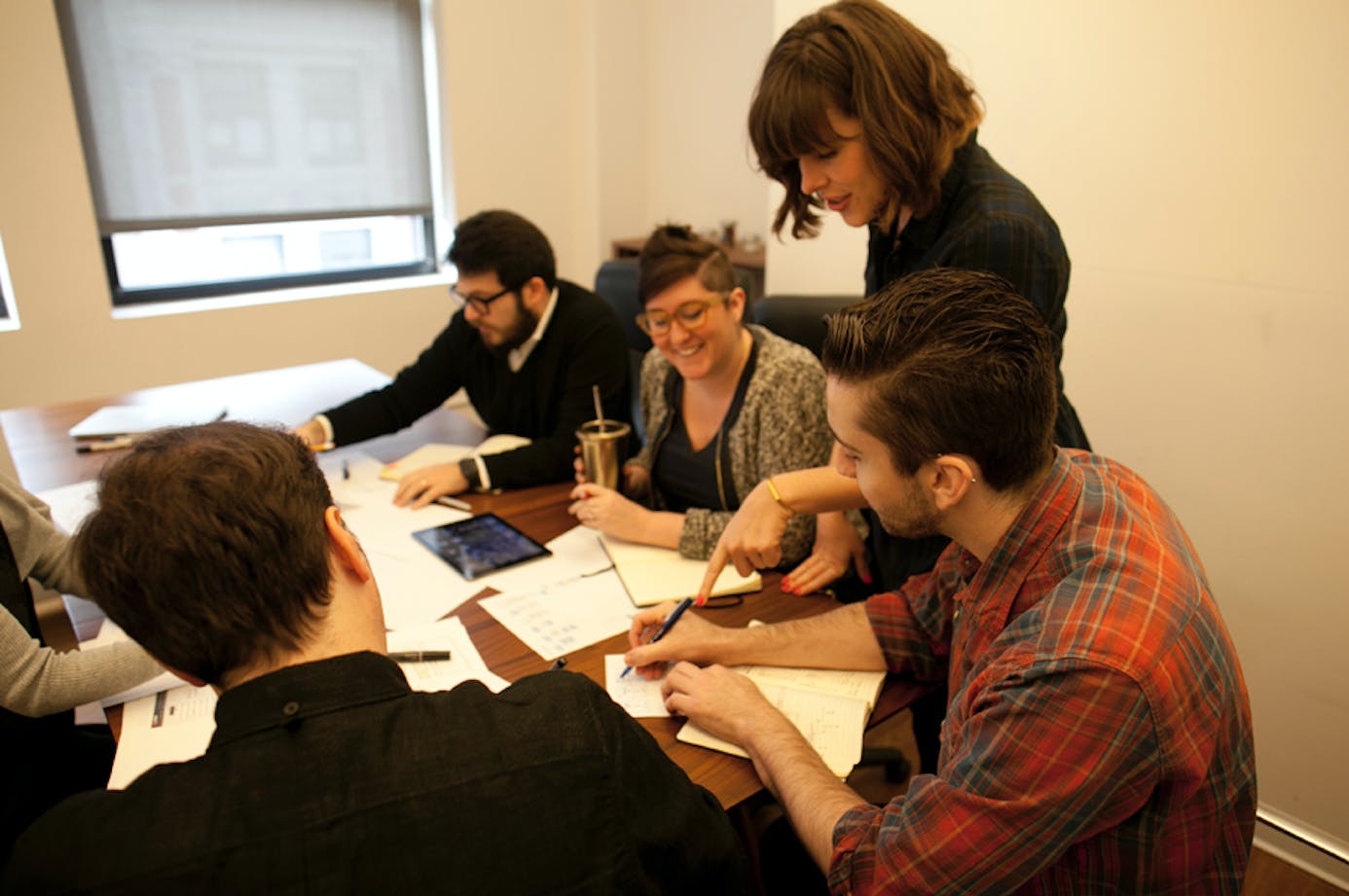20 Things We Learned in 20 Years of Digital Product Development and Design

As 2020 began, we started the year like most — with optimism and excitement for the days ahead. It’s hard to believe now that our New York team celebrated the holidays with a company party in January at the Blue Note Jazz Club — little did we know that would be the last time we’d be packed so close together in an indoor space.
While the disruptions of this year presented both hard-hitting challenges and spectacular opportunities, 2020 also happens to mark the 20th anniversary of the founding of Modus. As we reflect on a most unusual year and cap the end of two successful decades for our agency, we want to share some of the work and life lessons that we’ve learned over the past 20 years of collaborative culture and innovative work.
1. Keep humans at the center, always. When it comes to the products we are creating and our talented team working behind the scenes, people are our greatest asset. Our human-centered approach is why we’ve maintained long-time employees — 25% have been with us for more than 10 years — and our top three clients have been with us for more than 10 years, too.
2. Don’t forget that digital technology can be magical. It really can change lives. We got into this business to “think without limits.” In 2020, we’ve all witnessed the power of video conferencing and streaming to make remote work and learning possible. One of our most rewarding projects this past year was working with Sesamo, the Spanish language version of Sesame Street, to bring educational content to children in refugee camps. During the development process, we found new ways of using tools such as WhatsApp and localized Wi-Fi to bring much-needed programming to millions of kids in Latin America.
3. Never assume you know everything. There are no dumb questions. It’s better to have a crystal clear idea of what the client wants than leave a meeting afraid of asking a simple question. Similarly, when troubleshooting, de-bug everything — assume nothing.
4. Ideas do not stand on their own. They need explaining, visualizing, and championing to become a reality. Clear writing and visual storytelling can go a long way in communicating the value of a concept.
5. Don’t get stuck in a rut. Innovation can thrive even in the time of Coronavirus. Set aside time to expand your mindset, tackle that creative project you’ve neglected, and ask the questions no one has thought to ask. At Modus, we flex our creative muscles with quarterly Make-a-thons and ongoing Labs projects to encourage collaboration and out-of-the-box thinking.
6. Failure is a key prerequisite for success. The flipside of experimenting and taking risks is that you will have failures. The important thing is to learn from those setbacks and use them as an opportunity to come back stronger.
7. Start with something small that you know works and build from there. Rapid prototyping allows us to iterate quickly and build a feedback loop with clients.
8. Agile methodologies are a real game-changer. Once the design direction is established, we work in goal-oriented sprints. This keeps us focused on priorities and working closely with the client team, minimizing miscommunications and maximizing client and user satisfaction.
9. Perfect is the enemy of the good. We strive for greatness with every project, but perfection is not reality. Of course our clients have final say, but if we feel good about what we’re delivering, we want to get it in users’ hands as quickly as possible so we can adjust and continuously improve.
10. Ask for customer feedback. Organizations may think they know what customers want, but unless you ask for their input directly, you are making assumptions. In order to provide beneficial outcomes, reduce friction, and deliver moments of delight, you have to gather real human input early and often.
11. Honesty (and transparency) is still the best policy. Being transparent with our clients builds real trust. We also expect our clients will be honest and forthcoming with us. On rare occasions, there will be fires, and we will put them out. (Hopefully) no one will die.

12. Hire for potential and nurture growth. Having lots of experience and bringing that knowledge to the table is great, but it doesn’t always equal performance. We’re more interested in making sure our hires are motivated, passionate, and aligned with our company mission and culture. Hard skills can be learned, soft skills cannot. That’s why we promote continuous training — one of our core values is “Stay Hungry” — everyone on the team is expected to learn and grow.
13. Culture matters. To attract and retain the best people, who in turn, deliver the best work for our clients, we support them with a caring, inclusive, and inspiring company culture. We recognize a job well done, we gather team feedback often, and even when we’re working remotely, we find time to have some fun.
14. Invest in creating a company knowledge base, such as an intranet. It’s much easier to onboard and get everyone on the same page when company policies, team guidance, and shared resources are stored in one place.
15. Work smarter not harder. We rely on our stellar project managers, product managers, and a variety of productivity tools to keep us all on task and moving forward to meet deadlines. If everyone knows what to do, how to ask for help, and when it needs to be done, the work just flows.
16. Persistence conquers all adversity. Running an agency, like any other business, is a labor of love. You have to be committed to your ideas, believe in your work, and stay solution-oriented. When we challenge ourselves and each other, we polish our products into the most spectacular diamonds.
17. Find the root cause of problems. When you can step back from a problem to find the origin, a more elegant solution appears. Literally stepping away from the screen and taking a walk outside can bring clarity.
18. Time is an overlooked commodity. When evaluating cost, remember that your time is also valuable.
19. Test automatically and continuously. Automated testing is a mechanism that can save you from all sorts of headaches. You should adopt this methodology and practice into any iterative development process.
20. It’s all about endurance. Technology keeps changing. Challenges will keep arising. We eat our Wheaties. And we haven’t been replaced by robots, yet.
Of course, there are more than 20 things we’ve learned in this time, and we’re going to keep on learning for years to come. We’re looking forward to the next 20 years!


